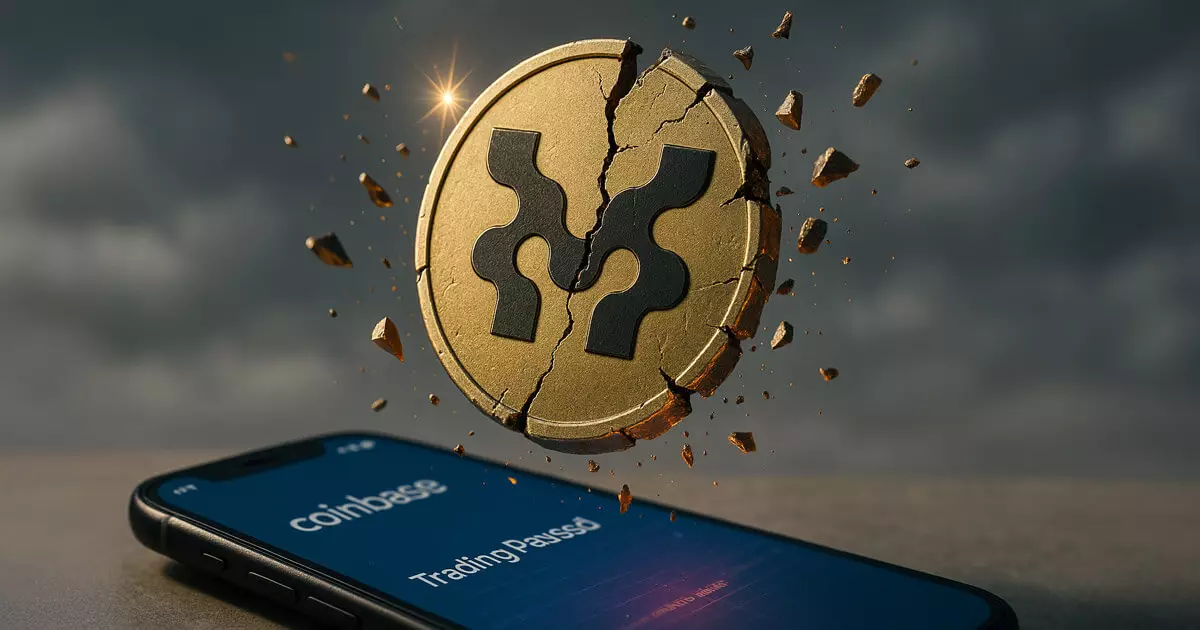The recent plunge of MOVE, the native token of the Ethereum-based Movement Network, serves as a clarion call for the crypto industry. Following Coinbase’s explosive decision to delist MOVE amid serious allegations regarding its market-making integrity, the digital asset witnessed an astonishing 23% drop in value, settling at an all-time low of $0.18. This shocking revelation isn’t merely about one token’s misfortunes; it raises grave questions about transparency and ethics in a sector that is already grappling with public skepticism. As MOVE’s value nosedived to nearly 84% below its December 2024 peak of $1.21, the crypto community must confront an unpalatable reality: trust in the system is more fragile than ever.
Behind the Curtains: The Shadowy Market Makers
Coinbase’s announcement, which will see MOVE trading suspended by May 15, is rooted in the troubling claims of dubious market-making operations affecting the token’s viability. Speculators are left pondering whether it is merely a corporate decision or a deeper issue of market manipulation. The internal investigation into Movement Labs’ co-founder, Rushi Manche, sent shockwaves throughout the ecosystem. His suspension was a harsh reminder that even the upper echelons of crypto projects are not immune to malfeasance. As we peel back the layers, we discover that the troubles surrounding MOVE are bound to a nameless market maker and its notorious relationships with lesser-known entities such as Rentech, which dealt millions of MOVE tokens in a questionable manner.
Investor Confidence: Is it Forever Damaged?
The dive in MOVE’s value represents not just a financial setback but a significant erosion of investor confidence. In an environment where many alts are competing for attention, the illusion of safety is shattered when a prominent exchange like Coinbase withdraws its support. The ramifications of this expulsion ripple through the industry and strike fear in the hearts of current and potential investors alike. Investors who had placed their faith in the Movement Network are asking difficult questions: What went wrong? How can we trust these digital entities? The answer lies in the ongoing chaos, where trust is cultivated on a tenuous foundation.
Rushi Manche’s Discontent: A Cry for Transparency
Rushi Manche, now a suspended co-founder, has voiced his disappointment with the current state of the Movement Network. His claims resonate with those feeling duped. Allegations of opportunistic players and “shadow actors” in decision-making roles problematize the narrative surrounding corporate governance within the crypto space. His assertion that he never personally profited from the token paints a somber picture: a frustrated visionary watching his dream crumble due to the reckless actions of others. The indifference of those he once trusted only amplifies the belief that systemic failures persist in the ecosystem.
A Shattered Dream: Lessons from the MOVE Debacle
The demise of MOVE offers sobering lessons for investors and developers. The crypto space is rife with ambition and innovation, but it is overshadowed by ethical dilemmas and irresponsible governance. The consequence of mixing idealism with opportunism can lead to disastrous outcomes, as seen with Manipulative market makers wielding undue influence on asset valuations. The Movement Network’s $38 million buyback initiative, while an attempt to restore trust, may be seen as too little, too late. Investors caught in the crossfire will likely see this as a failure to protect their interests.
The Way Forward: Time for Accountability
What is desperately needed now is accountability and reform. Movement Labs can no longer afford to be complacent; comprehensive transparency and adaptive governance must emerge to rebuild what has been lost. Engaging firms like Groom Lake for due diligence is a step in the right direction, but it must be paired with sincere efforts to address the root causes of the scandal. Until then, the MOVE token crisis will remain emblematic of larger issues plaguing the crypto industry, highlighting a profound disconnect between the promises of decentralization and the reality of corporate malfeasance. The stakes are high, and the need for genuine reform is alarmingly pressing.
















Leave a Reply